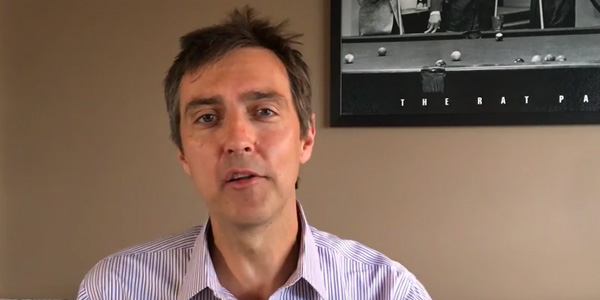
In part one of this two-part series (titled “Winning on the Hire,” February 2017 BodyShop Business), I discussed taking the topic of training to a much higher level. I urged you to slow down a bit on the front end of hiring to enable yourself to hire the “right” candidate rather than a warm body.
Now, I want to take on your inner environment, your company culture – you. I want you to look inward at your leadership and the organization’s management.
This may well be the missing link between you and a well-oiled machine flush with human capital who are active, engaged and making your business the powerhouse it has the potential to be. Joining me in this discussion are several industry leaders, including:
Jay Perry
Ally Business Coaching
Ally Business Coaching founder Jay Perry, co-author of “The Success Manifesto,” subscribes to the theory that technical training is, of course, very important. But, Perry says, the greatest threat to business today is a lack of proper leadership.
“Leadership, properly developed, will support the appropriate things to be done inside the company for it to succeed wildly,” he says. “It has been established that, on average, nine years of supervising people goes by before a leader gets formal training in leadership. That’s a lot of wasted time and money where people quit poor leaders or are misguided by them and ultimately disillusioned and disengaged, thus working at below optimum. Paying more attention to leadership development than you think is wise if you want to start to soar like eagles.”

Perry also says, “Success is not accomplished in one stroke but is more like building a brick wall – one brick at a time. Patience has to play a part in the formula: patience with self as well as with others.”
When considering hiring, Perry recommends, “Screening through assessment is tops. Without assessment, you are guessing and wasting time and money and spoiling your reputation. Most organizations do not have a proper on-boarding procedure. They waste a lot of time while the kid is learning the ropes through trial and error, causing feelings of alienation and inefficient attempts to become part of the existing team.”
If you’ve been following my articles, you know that millennials are a key focal point. I asked Perry for his take on millennials in the workplace, and he said, “The differences with millennials is greatly overstated and often used as an excuse for not putting in the proper work in truly managing. Management is not lazy work. It was easier in times past but, if anything, the onset of millennials into the workforce is causing good management techniques – such as frequent assessments and feedback – to become part of the way we do business. They want the same things that everyone has always wanted: chance for advancement, respect and a feeling of belonging, and fair compensation. They do have a different view of that last one, fair compensation, and that requires management to get creative with things like leave time, flex hours and more personally customized packages.”
David Luehr
Elite Body Shop Solutions
www.elitebodyshopsolutions.com
David Luehr from Elite Body Shop Solutions and author of “The Secrets of America’s Greatest Body Shops” joins me in suggesting we look inward when we have challenges with our workforce, or lack thereof.
“These concerns are understandable,” Luehr points out. “But when you are viewing this situation from outside of your victim zone, you may realize that a large percentage of our own employee shortages are actually our own fault as business leaders. The best shops in the country don’t wait until they desperately need someone. The best shops work on recruitment proactively. In other words, they interview and reach out to the best potential employees even when they don’t have a spot on the roster for them yet. They begin the process of building relationships with potential future employees that will best fit their business model and their culture. For growing companies, this is a must! I am sure you know how dysfunctional the cultures can be at shops that always hire out of desperation.”

How about millennials, David? “If you want millennials to come to work for you and – better yet – stay for awhile, you need to lead with your ‘why.’ These youngsters are smart enough to want to contribute to something more meaningful than just wrenching on a car in exchange for a buck. Make sure they know WHY wrenching on that car makes a difference in someone’s life, and how their efforts are contributing to the mission of the company.”
Jeff Peevy
President, Automotive Management Institute (AMi)
Another industry leader I turned to for this discussion was Jeff Peevy from AMi. Peevy and I talked about in-house culture, and this is what he told me: “The culture within the business has more to do with retention of employees than any other single thing. The catch to this, though, is what kind of employee does the business retain? The culture determines who stays and who doesn’t. Look at your longer-term employees and you will begin to get an indication of the type of culture that exists in your business. Do they like to learn? Do they resist and question the need to change?
“From my personal observations, repair businesses that place a lot of emphasis on continual learning and sharing knowledge tend to retain the industry’s very best. When businesses understand learning as the only source of a sustainable competitive advantage, and expose that belief up front when recruiting, the pool of candidates they attract tends to be better. So, having a strong element of learning culture within the overall business culture ultimately determines the business’s ability to maintain a competitive edge.”
Peevy points to key elements of leadership that need to be present in a top-shelf organization.

“From my observations, trustworthiness and the ability to communicate are key. The team must be able to trust and have confidence in leadership. Leadership must be able to communicate, in the most sincere and effective ways. Here’s an example. When leadership is encouraging an employee to attend a training class, but when he employee comes back excited about what they have learned and their manager responds, ‘I would have thought you knew that,’ the employee begins to distrust their ability to be open and honest. It is in this type of business where everyone acts like they know everything, so the crucial element of learning and sharing knowledge is minimized.”
This is why Peevy does what he does at AMi. He endeavors to fill the need for training by collaborating with industry experts and training providers. AMi provides credits for hundreds of live instructor-led classes and online courses that can be used to earn your way toward an Accredited Automotive Manager (AAM) degree, or Master degree (AMAM). Course topics include listening and phone skills, improving CSI, social media management, Internet and email security, and understanding financial statements. AMi provides certificates and professional designations to support administrative and management career paths. As Peevy puts it, “The next generation of successful collision repair businesses will keep their administrative staff well-trained and skills well-honed.”
Simon Sinek
Author and nationally recognized speaker
Approximately 28 million people watched a TED Talk featuring Simon Sinek discussing how the best leaders start with a simple, one-word question: “Why?” When you approach things from this perspective, you can build a stronger foundation for your company and lead and inspire your team. Let me recommend you read and apply what you learn from Sinek’s books “Start With Why” and “Leaders Eat Last.”
If you can invest 15 minutes in trying to understand millennials better, I highly recommend you watch this YouTube video. In this video, Simon explains that just about everything a millennial might want they can have instantaneously through online access to social media, YouTube, Hulu, apps, etc. With that, they get instant gratification and a scientifically proven shot of dopamine that provides comfort and a sense of well-being. Everything they want…except, of course, job satisfaction and strength of personal relationships.
“There ain’t no app for that,” says Simon. “They are slow, meandering, uncomfortable, messy processes.”
As was covered in my Millennial Takeover Workshop, 66 percent of millennials expect to leave their current place of employment within the next three years. Are you ready for that? According to Simon – and plenty of other research out there – millennials are often unfulfilled in their jobs and don’t feel they’re making an impact. It won’t take long for them to express those feelings and frustrations. Their attention span and lack of patience is on full display as they’re expressing these in their first few months of employment!
In this video, Simon says, “It’s as if [the millennials] are at the foot of a mountain, and they have this abstract concept called ‘impact’ that they want to make in the world, which is the summit. What they don’t see is the mountain. I don’t care if you go up the mountain quickly or slowly, there’s still a mountain. And so what this young generation needs to learn is patience, that some things that really, really matter – like love, or job fulfillment, joy, love of life, self-confidence, a skill set – take time. The overall journey is arduous and long and difficult, and if you don’t ask for help and learn that skill set, you will fall off that mountain.
“Or the worse-case scenario, and we’re already seeing it, is we are seeing an increase in suicide rate in this generation. We’re seeing an increase in accidental death due to drug overdoses. We’re seeing more and more kids drop out of school or taking leave of absence due to depression. The best-case scenario is you’ll have an entire population growing up and going through life and just never really finding joy. They’ll never really find deep, deep fulfillment in work or life. They’ll just waft through life and it’ll be just fine. ‘How’s your job?’ ‘Fine (shrugs), the same as yesterday.’”
Are They Just ‘Fine’?
So, as you consider your millennial employees, are they just “fine”? Are they feeling a sense of accomplishment? Do they think they are making an impact? Are they fulfilled?
If they are just “fine,” they won’t likely be around long, since two out of three of them don’t plan to stick around. They’ll continue their journey through life looking, quite aimlessly, for purpose and accomplishment and fulfillment and joy, and your place of employment will be just another stop along the way. Unless, of course, you make your place of employment the mountain with a clear sense of direction, a clear path to the summit with base camps along the way, always with an eye on the top and how you plan to help them get there. They need a clear sense of knowing why you do what you do and why you do it the way you do and why does it matter anyway?
Why does it matter?
Consider the soccer mom and her minivan. She gets into a fender bender and her van is now in your shop. She needs it fixed ASAP. She uses that van for everything: taking kids to school, the doctor, soccer practice, going to the grocery store, etc. Not having it causes stress and forces her to work around things without the ease and convenience she’s come to expect from her beloved van. But there it sits, in your shop. And now you have your purpose for the millennial!
Don’t you see?! The impact you have when you fix her van properly and quickly is that she gets her van back and life returns to normal. You’ve impacted an entire family, and you’ve made her happy.
Oh look, there’s the next vehicle to fix, a pickup truck. It belongs to a guy who uses it to go to areas of the country that have been hit by storms. He takes his extension ladder everywhere he goes in this truck and writes estimates for property damage…but not while it’s sitting in your shop. This is how he makes his living and provides for his family. He impacts the lives of so many others with his job. We’ve got to get him back on the road!
Can you feel it? Can you gather a story with each vehicle that comes in the door and communicate that to your team? You can turn an inanimate object into a human story. It’s not hard to do, and will give your team a sense of purpose with each and every vehicle that comes in the door. The summit, or impact you can have in the world and long-term job satisfaction, is now attainable with the proper training and teamwork. This will help you teach them patience and perseverance. Your culture can make that happen for your team, and you’ll stand a better chance of keeping the team together if you approach things this way.
This is the inner environment of the workplace. Simon Sinek discusses this in the YouTube video as well. He says, “We’re taking this amazing group of fantastic kids who were just dealt a bad hand, through no fault of their own, and we put them in corporate environments that care more about the numbers than they do about the kids. They care more about the short-term gain than the long-term life of this young human being. We care more about the year than the lifetime.
“And so we are putting them in corporate environments that aren’t helping them build their confidence, that aren’t helping them learn the skills of corporations, that aren’t helping them overcome the challenges of a digital world and finding more balance. That isn’t helping them overcome the need to have instant gratification and teach them the joys of impact and the fulfillment you get from working hard on something for a long time that cannot be done in a month or even in a year.”
Sinek continues, “And so we are thrusting them into corporate environments, and the worst part about that is they think it’s them, they blame themselves, they think it is them who can’t deal and so it makes it all worse. It’s not! I’m here to tell them, it’s not them, it’s the corporations, it’s the corporate environment, it’s the total lack of good leadership in our world today that is making them feel the way they do. It’s the company’s responsibility, it sucks to be you, right? But we have no choice. I wish society and their parents had done a better job…they didn’t. So we’re getting them in our companies and we now have to pick up the slack. We have to work extra hard to figure out the ways that we build up their confidence, we have to work extra hard to find ways to teach them the social skills that they are missing out on.”
Start with YOU
What all this, from February 2017’s cover story to this month’s article, is telling you is that you must first start with you. If you’re closed to new ideas, you will take this as criticism. Please don’t. It’s heartfelt advice that can impact you, your people and your organization long term. Are you properly trained to handle what is becoming increasingly evident in the workplace? For more than 20 years, I’ve said that sometimes this industry can be its own worst enemy. Workforce development and internal culture are two of the best examples of this. Don’t allow it anymore.
If I owned and ran a body shop, I would be scared to death that I wouldn’t have the workers I would need in the not-so-distant future, or frankly right now for that matter. I, as a shop owner, must read some books on leadership in today’s workplaces. I would recognize that I need to attend training that immerses me in what I can do and communicate to my team, as a leader, about where we’re going and how we’re going to get there together. I would have to start with why, I would have to explain the impact we will have on the world and the world around us. I would be seeking a business coach who would help me be the best leader I can be – a coach who would help me grow and continuously learn and hold me accountable for certain deliverables over time that would make the impact necessary for me to join the ranks of the industry’s greatest shops.
Even if you’re a relatively small shop, you need to heed this advice. No one is immune. For larger shops and MSOs, you need to extend this internal leadership training to anyone who oversees people in your organization.
Sure, you may survive without learning new ways and enlisting the help of experts in the field. But it will be a struggle. It already is! You will always be battling to replace people who go through the revolving door of employment in your shop. You’ll be increasingly frustrated and want out, or you’ll be so comfortable in your own chaos that you’ll get by…just. I’ve seen it at the shop level for some time now. But there is a better way.
The opportunity to be all that you can be as a leader is within your reach, and so is increased job satisfaction and fulfillment for you and your team. You just need to take the first steps to get the ball rolling. I hope you will.














